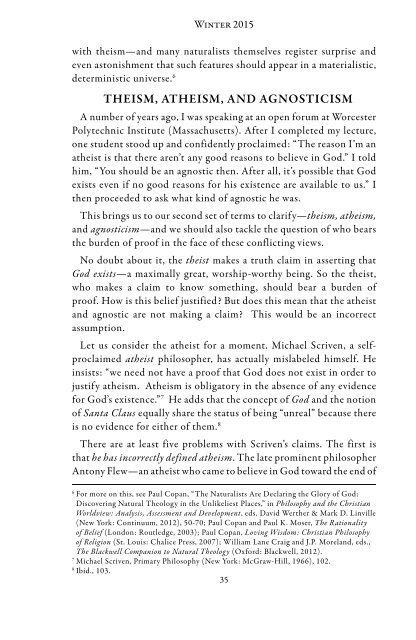THE CITY
h6c7p5d
h6c7p5d
You also want an ePaper? Increase the reach of your titles
YUMPU automatically turns print PDFs into web optimized ePapers that Google loves.
Winter 2015<br />
with theism—and many naturalists themselves register surprise and<br />
even astonishment that such features should appear in a materialistic,<br />
deterministic universe. 6<br />
<strong>THE</strong>ISM, A<strong>THE</strong>ISM, AND AGNOSTICISM<br />
A number of years ago, I was speaking at an open forum at Worcester<br />
Polytechnic Institute (Massachusetts). After I completed my lecture,<br />
one student stood up and confidently proclaimed: “The reason I’m an<br />
atheist is that there aren’t any good reasons to believe in God.” I told<br />
him, “You should be an agnostic then. After all, it’s possible that God<br />
exists even if no good reasons for his existence are available to us.” I<br />
then proceeded to ask what kind of agnostic he was.<br />
This brings us to our second set of terms to clarify—theism, atheism,<br />
and agnosticism—and we should also tackle the question of who bears<br />
the burden of proof in the face of these conflicting views.<br />
No doubt about it, the theist makes a truth claim in asserting that<br />
God exists—a maximally great, worship-worthy being. So the theist,<br />
who makes a claim to know something, should bear a burden of<br />
proof. How is this belief justified? But does this mean that the atheist<br />
and agnostic are not making a claim? This would be an incorrect<br />
assumption.<br />
Let us consider the atheist for a moment. Michael Scriven, a selfproclaimed<br />
atheist philosopher, has actually mislabeled himself. He<br />
insists: “we need not have a proof that God does not exist in order to<br />
justify atheism. Atheism is obligatory in the absence of any evidence<br />
for God’s existence.” 7 He adds that the concept of God and the notion<br />
of Santa Claus equally share the status of being “unreal” because there<br />
is no evidence for either of them. 8<br />
There are at least five problems with Scriven’s claims. The first is<br />
that he has incorrectly defined atheism. The late prominent philosopher<br />
Antony Flew—an atheist who came to believe in God toward the end of<br />
6<br />
For more on this, see Paul Copan, “The Naturalists Are Declaring the Glory of God:<br />
Discovering Natural Theology in the Unlikeliest Places,” in Philosophy and the Christian<br />
Worldview: Analysis, Assessment and Development, eds. David Werther & Mark D. Linville<br />
(New York: Continuum, 2012), 50-70; Paul Copan and Paul K. Moser, The Rationality<br />
of Belief (London: Routledge, 2003); Paul Copan, Loving Wisdom: Christian Philosophy<br />
of Religion (St. Louis: Chalice Press, 2007); William Lane Craig and J.P. Moreland, eds.,<br />
The Blackwell Companion to Natural Theology (Oxford: Blackwell, 2012).<br />
7<br />
Michael Scriven, Primary Philosophy (New York: McGraw-Hill, 1966), 102.<br />
8<br />
Ibid., 103.<br />
35


